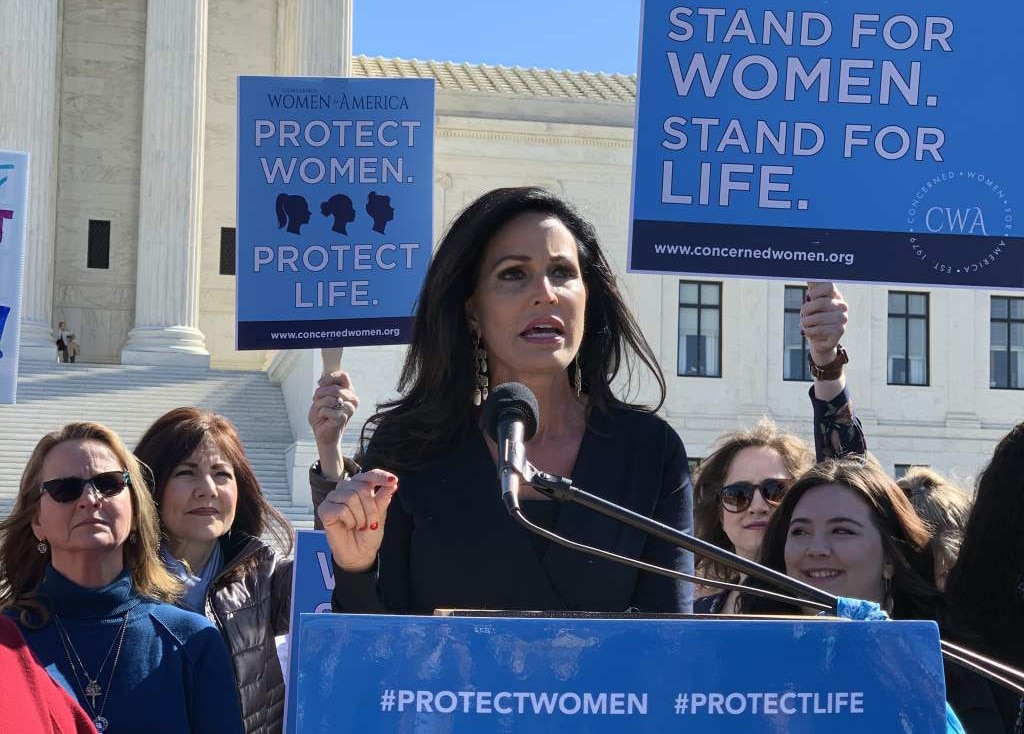June Medical Services v. Russo oral arguments at the Supreme Court.
This week the United States Supreme Court heard oral arguments in an important case where abortionists are challenging a Louisiana law that requires they keep admitting privileges at nearby hospitals within 30 miles of the clinic where they perform abortions.
Concerned Women for America (CWA) was there to represent you both inside the courtroom (where the arguments were happening) and outside (where dueling rallies represented the conflict for the media). Both settings presented us with the challenge of our time— an irrational, rabid, and extremely radical pro-abortion mob that promotes abortion as the ultimate good, rejecting even the most basic of parameters of human decency.
Recently, for example, the U.S. Senate rejected the Born Alive Survivors Protection Act which simply required doctors to provide standard medical care to a baby who is born alive after a botched abortion. That’s a baby who has already been born! But it didn’t matter to the pro-abortion loyalists, who unfortunately are many in the Senate. Today’s radical, pro-abortion syndicate cannot, will not, accept anything less than the celebration of abortion for any reason up to the point of birth (and beyond, depending on the desires of the mother), paid for and promoted by you and me, the taxpayers.
This radicalism was evident at oral arguments, too. Julie Rikelman, who represented June Medical Services, could not envision any circumstance in which a law requiring admitting privileges for abortionists could be constitutional. This is significant because, under the direct precedent of the Court in Whole Woman’s Health v. Hellerstedt, which (erroneously) invalidated a Texas law, the Court’s inquiry is entirely fact-based depending on the specific situation of each state where a similar medical requirement is enacted.
Chief Justice Roberts tried to establish this simple fact as a starting point for further discussion but found no common ground from Ms. Rikelman.
CHIEF JUSTICE ROBERTS: Counsel, do you agree that the inquiry under Hellerstedt is a factual one that has to proceed state-by-state?
MS. RIKELMAN: Your Honor, I think that facts may vary, but what we know is that the district court held a trial here and found that there were no material differences between this case and –
CHIEF JUSTICE ROBERTS: No, no, I know, but if — if the issue, the statutes are on the books in other states, and if the issues are raised there, is the same inquiry required in each case? You have to have the district court examine the availability of specific clinics and the admitting privileges of doctors so that the litigation could be — the results could be different in different states?
MS. RIKELMAN: […] the burdens of a law may vary, but a law that has no benefits and doesn’t serve any valid state interest is much more likely to impose an undue burden.
Justice Brett Kavanaugh, similarly, tried several different ways to ask for any scenario where a similar law could be upheld. If the law had no effect whatsoever on providers, could it be constitutional? The counsel for the abortionists danced around the issue as much as she could, but she was ultimately pushed to admit that they could never be constitutional.
JUSTICE KAVANAUGH: Can I follow up on the Chief Justice’s earlier question and mine as well? Are you saying that admitting privileges laws are always unconstitutional, such that we don’t have to look at the facts in — state by state? Or are you saying that actually you do look at the facts state by state, and in some states, admitting privileges laws could be constitutional, if they impose no burdens?
MS. RIKELMAN: Your Honor, the burdens may vary, but a law that has no benefit and serves no valid state interest, which is what this Court held in Whole Woman’s Health, is much more likely to be an undue burden.
JUSTICE KAVANAUGH: Could an admitting privileges law of this kind ever have a valid purpose, in your view?
MS. RIKELMAN: No, Your Honor.
Abortion extremists give not an inch. They demand no limits on abortion. Even accepted medical standards must be surrendered at the altar of “choice.”
In this case, Louisiana asks this same requirement of all doctors that perform outpatient procedures in the state. But somehow, according to “Big Abortion,” abortionists must be exempt from it.
Even Justice Ruth Bader Ginsburg was surprised by this fact as she approached the topic with Louisiana Solicitor General Elizabeth Murrill.
JUSTICE GINSBURG: What about a D&C after a miscarriage? As I understand it, these two procedures are very much alike. Are similar regulations, about 30 miles, and admitting privileges applicable to a D&C following a miscarriage?
MS. MURRILL: Under the ambulatory surgery center regs, yes. Under the office practice regs which do not regulate abortion clinics, a doctor who doesn’t have a — have a residency in the proper scope of care would have to have admitting privileges and would have to have them within a 30-mile radius of — of the clinic. So, it’s the same requirement.
JUSTICE GINSBURG: It is the same?
MS. MURRILL: Yes.
JUSTICE GINSBURG: I thought there was something in the record suggesting there was no such requirement for D&C following a miscarriage.
She thought wrong. Louisiana’s law is meant to protect women. The women of Louisiana supported it and helped pass it. According to a Knights of Columbus-Marist poll, 71 percent of women (both pro-life and pro-choice women) want doctors who perform abortions to be required to have hospital admitting privileges. But Big Abortion ignores women when it is inconvenient to their narrative. To them, that law is simply an attack on its bottom line. Abortion profits motivate them, not women’s safety.
Let us pray the Court sees right through this conflict of interest and stands with the women of Louisiana by upholding this law. A decision is expected this summer.






